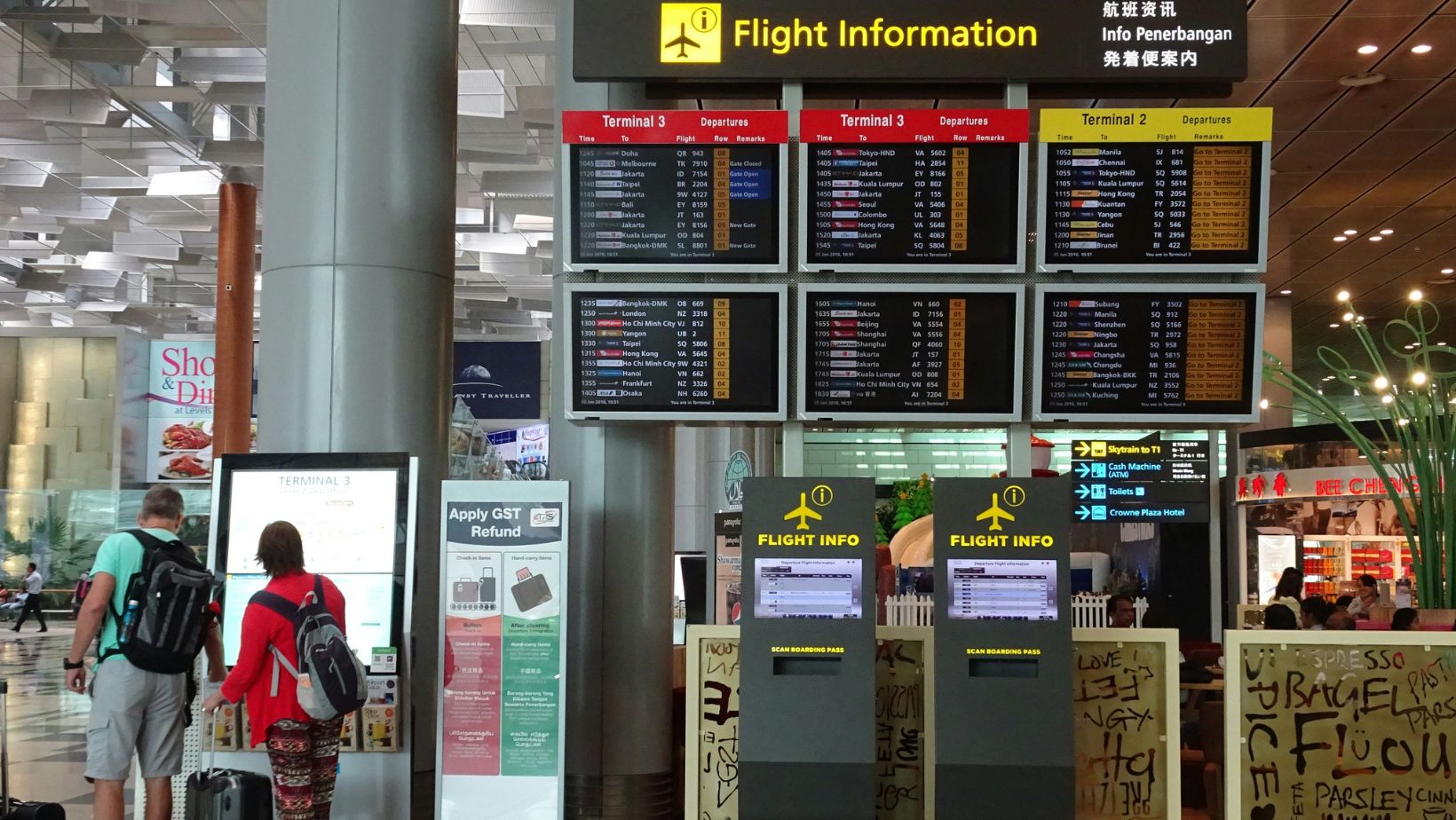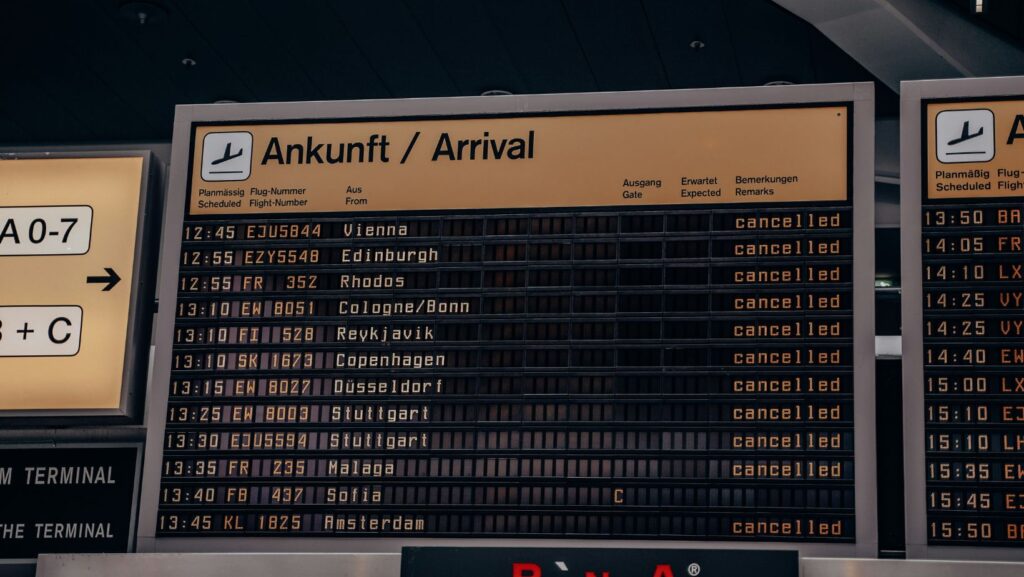Flight cancelled? Don’t panic.
Every year, thousands of passengers get stuck at airports because their flights get cancelled. In 2024 alone, about 140,000 flights were cancelled out of over 5 million flights in the US. That’s a cancellation rate of 2.76%.
Here’s the thing…
Most passengers have absolutely no idea they’re entitled to compensation. They think a voucher or a “sorry for the inconvenience” is all they’ll get. But the truth is, you might be owed hundreds or even thousands of dollars.
Without knowing your rights, you’re leaving money on the table.
That’s why this guide will show you exactly what you need to do to get the compensation you deserve.
What You’ll Discover:
- Know Your Rights When Airlines Cancel Your Flight
- US vs EU Compensation: The Major Differences
- Filing Your Compensation Claim: Step by Step
- Common Mistakes That Kill Your Compensation Claims
Know Your Rights When Airlines Cancel Your Flight
Let’s start with the basics.
When your flight gets cancelled, you have certain rights. The problem is that airlines don’t always tell you about them upfront. They’d rather you take a voucher and move on.
But here’s what you need to know…
In the US, new rules from the Department of Transportation mean you’re now entitled to automatic refunds when your flight is cancelled or significantly delayed. No more fighting for your money back.
For EU flights, the rules are even better. Under EU Regulation 261/2004, you can claim compensation of €250 to €600 depending on your flight distance and delay length.
And here’s something most people don’t realize…
These compensation rules can apply even if you’re flying on a US airline. If your flight departs from the EU or arrives in the EU on an EU airline, you’re covered by the stronger EU rules.
Pretty cool, right?
Below, this guide will explain how to claim this compensation to get great and fast results!
US vs EU Compensation: The Major Differences
The compensation you can get depends on where you’re flying.
US Rules:
- Automatic refunds for cancelled flights
- Airlines must provide meals and hotel accommodations when they cause the disruption
- No mandatory cash compensation for delays
- Each airline has different policies for additional compensation
EU Rules:
- Up to €600 compensation for delays over 3 hours
- Applies to flights departing EU or arriving in EU on EU airlines
- Compensation is required unless “extraordinary circumstances” apply
- Additional rights to meals, accommodation, and rebooking
The EU rules are way more passenger-friendly. That’s why it’s crucial to know which rules apply to your specific flight.
It really is that simple.
Filing Your Compensation Claim: Step by Step
Ready to claim what you’re owed? Here’s exactly how to do it.
Step 1: Gather Your Documentation
Before you do anything else, collect these essential documents:
- Your boarding pass
- Original ticket or booking confirmation
- Any written notices from the airline about the cancellation
- Receipts for additional expenses (meals, hotels, transport)
Pro tip: Take photos of airport departure boards showing your flight status. This can be valuable evidence later.
Step 2: Understand Why Your Flight Was Cancelled
The reason matters more than you think.
Airlines must pay compensation for cancellations caused by:
- Technical problems
- Staff shortages
- Overbooking
- Maintenance issues

They don’t have to pay for “extraordinary circumstances” like:
- Severe weather
- Air traffic control strikes
- Security threats
Step 3: Contact the Airline Directly
Start by filing a claim with the airline. Most airlines have online claim forms, but you can also call their customer service.
When you contact them, be clear about:
- What happened
- What compensation you’re claiming
- What evidence you have
Don’t accept the first “no” you get. Airlines often deny valid claims hoping passengers will give up.
Step 4: Know Your Deadlines
Time limits vary depending on your situation:
- EU claims: Usually 2-6 years depending on the country
- US claims: No specific deadline for refunds, but act quickly
- Some countries only give you a few months to file
Don’t wait. The sooner you file, the better your chances.
Common Mistakes That Kill Your Compensation Claims
Want to know the biggest mistakes passengers make? Here they are.
Mistake #1: Accepting Alternative Compensation Too Quickly
Airlines love to offer vouchers instead of cash. But here’s the thing – you’re entitled to cash compensation in many cases.
Don’t sign anything that waives your right to compensation. Take time to understand what you’re actually owed.
Mistake #2: Not Keeping Proper Records
You need evidence to support your claim. Without proper documentation, even valid claims can be denied.
Keep everything. Every email, every receipt, every boarding pass. You never know what might be important.
Mistake #3: Giving Up After the First Rejection
Airlines reject valid claims all the time. They’re hoping you’ll give up and move on.
But persistence pays off. If your claim is valid, keep pushing.
When Airlines Must Pay (And When They Don’t)
Not all cancellations are created equal.
Airlines must provide compensation when the cancellation is their fault. This includes things like crew scheduling problems, aircraft maintenance, and technical issues.
They don’t have to pay when the cancellation is caused by extraordinary circumstances beyond their control.
But here’s where it gets tricky…
Airlines will try to blame everything on “extraordinary circumstances” even when it’s not true. They might claim weather caused the cancellation when it was actually a maintenance issue.
That’s why you need to do your homework. Check weather reports and other factors that might have affected your flight.
Getting Help with Your Claim
Filing a claim yourself can be time-consuming and frustrating.
That’s why many passengers use cancelled flight compensation services. These companies handle the entire process for you – from filing the initial claim to dealing with airline rejections.
They work on a no-win, no-fee basis, so you only pay if they successfully get your compensation. For many passengers, this is worth the peace of mind.
Making Your Claim Bulletproof
Want to maximize your chances of success? Here’s how to make your claim as strong as possible.
Be Specific and Detailed
Don’t just say “my flight was cancelled.” Explain exactly what happened:
- What time you arrived at the airport
- What announcements were made
- How long you waited
- What the airline staff told you
Include All Your Expenses
You can often claim for reasonable expenses caused by the cancellation:
- Meals while waiting
- Hotel accommodation
- Transport to and from the airport
Keep every receipt and be reasonable with your expenses.
What to Do When Airlines Refuse to Pay
Sometimes airlines will reject valid claims. Here’s what to do next.
Check Their Reasoning
Airlines must explain why they’re rejecting your claim. Look carefully at their response – is their reasoning actually valid?
Common invalid reasons include:
- Blaming weather when it was actually a technical issue
- Claiming “extraordinary circumstances” without proof
- Saying you’re not entitled to compensation when you clearly are
Escalate Your Complaint
If the airline won’t pay, you can escalate to:
- The Civil Aviation Authority (in the UK)
- The Department of Transportation (in the US)
- Your national aviation authority (in EU countries)
These bodies can investigate and force airlines to pay.
Wrapping This Up
Cancelled flight compensation isn’t complicated once you know the rules.
The key is understanding your rights, keeping good records, and being persistent. Airlines are counting on you to give up – don’t let them win.
Remember:
- Know which rules apply to your flight (US or EU)
- Keep all your documentation
- File your claim promptly
- Don’t accept the first “no”
With flight cancellation rates affecting millions of passengers each year, knowing your rights is essential.
Your cancelled flight might be frustrating, but it doesn’t have to be financially devastating. Get what you’re owed.

